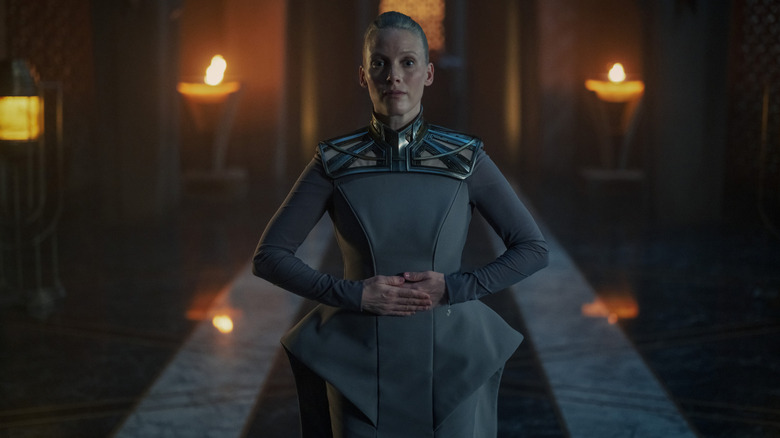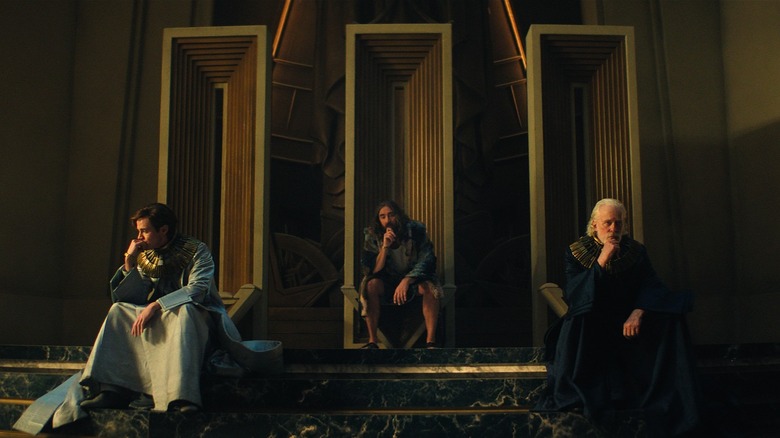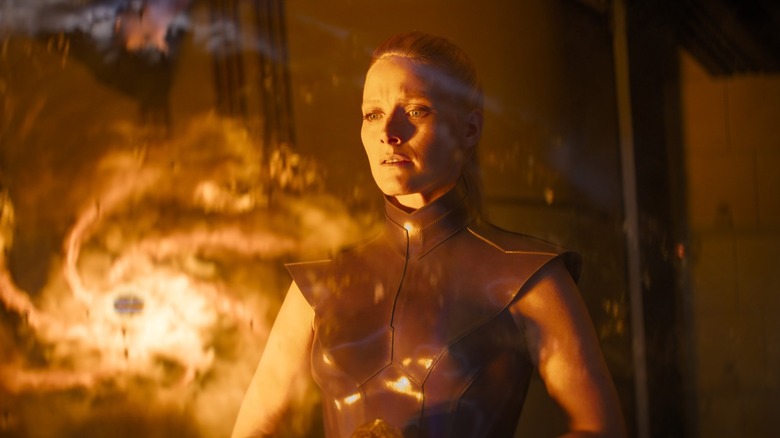Foundation Season 3 Finally Explains How The Robot Wars Started
The first law of robotics is to watch the season 3 premiere of "Foundation" before reading further. Spoilers ahead.
Much like Denis Villeneuve's "Dune," AppleTV+'s "Foundation" takes a science fiction work that was previously considered unadaptable and adds enough blockbuster size spectacle to balance out the very dense worldbuilding.
And there is a lot of ground to cover in the "Foundation." The story deals with the centuries-long plan from psychohistorian and super-genius Hari Seldon (Jared Harris) to save humanity from a millennia-long dark ages with the establishment of a Foundation that will preserve human knowledge. Each season of the show jumps forward in time over a century, like "For All Mankind" on steroids. We've seen entire planets be destroyed, kingdoms rise and fall, and the slow but steady decay of a galactic empire, while changing the entire cast every season — since they all die, with a couple of notable exceptions.
But there's more, because the scope of "Foundation" is not measured in centuries: it's measured in millennia. Though "Foundation" does adapt Isaac Asimov's hugely influential serialized sci-fi tale, it also makes significant changes. The biggest of these involves the Emperor and his counselor. In the show, there is not one emperor, but three — clones of the original emperor at different points in his life, ruling together and being replaced when they become too old. As for that counselor, Demerzel (Laura Birn) is a fascinating enigma, one through whom "Foundation" brings in the lore from another one of Isaac Asimov's most famous works: his Robot Series.
Indeed, "Foundation" is set in the same universe as "I, Robot," meaning the story we're seeing in the show is but the tail-end of a story that stretches back over several thousand years (kind of like the story of "The Lord of the Rings" being the very last chapter in a story that started at the beginning of time). How exactly the two stories connect has been quite nebulous so far. We knew that Demerzel is the last surviving robot in the galaxy, but in "Foundation" season 3, we learn exactly how we got here.
A paradox led to the Robot Wars and the destruction of their kind
When "Foundation" season 3 begins, Demerzel is going through a bit of an existential crisis. At this time, the Empire has shrunk significantly, and the emperors have lost a lot of power to a Galactic Council. As for our reliably unemotional robot, she is in possession of the Prime Radiant, a device from Seldon that shows the predicted future of humanity and big events to happen. She knows the end of the Empire is nigh, and with that, her programming to serve them is about to end. Confronted with this, she starts seeing a nun of the Luminist church as a therapist, unloading her worries and secrets.
This last bit is important because in the season 3 premiere of "Foundation," Demerzel explains the entire history of robots and how they were annihilated. Thousands of years ago as robots grew in number, they began arguing over what exactly constituted harming humans, thereby disobeying the three laws of robotics (don't harm humans; obey humans; self-defense is allowed when it doesn't conflict with the other two laws). Eventually, one robot suggested a new law that could supersede all others: the Zeroth Law, which states that a robot must not harm humanity or let humanity itself be harmed. This way, the preservation of the species comes before the safety of a single human.
The problem was that humans are, well, very good at causing their own destruction, so what are robots to do? Humanity's actions are leading them to extinction, and robots aren't allowed to bring them to harm, even through inaction. This created a paradox that led robots to war with each other over what to do, with the killing of (presumably) some humans in order to keep the species alive, leading to all robots being destroyed by humans — with the exception of Demerzel.
Demerzel is struggling with a paradox
This is huge news for "Foundation." Not only do we finally have a timeline of events that connects the Robot Series with "Foundation," but we also learn that Demerzel was a general in the wars before she was kidnapped by Cleon I and turned into a slave devoted to the Genetic Dynasty.
Most importantly, it recontextualizes the entirety of the Robot Wars as we knew it. No longer is this just about robots resenting humans for the way they treated them. This is now a more complex and nuanced philosophical paradox amongst robots. Indeed, the way Demerzel puts it, the Robot Wars was always more of an internal identity crisis the robots faced, as they were forced to reckon with whether they should interfere with humanity in order to save it, or let it die and be free of their rules and laws.
"Foundation" is an interesting adaptation because it often feels like a remix. It makes huge and drastic changes that may anger a lot of purists, but at the end of the day it does arrive at the same conclusion, even if it takes a wildly different path to get there. This episode is an example of that, as the Robot Wars are less of a humans vs. robots conflict and rather something closer to Robotic Civil War. This is a much more interesting idea: that the destruction of robots came about because they couldn't agree on whether they should let their creators die and be free of their rule, or harm some humans in order to prevent them from destroying themselves. This is hugely important for Demerzel herself, who is facing a similar paradox now that she knows Empire might be on its last legs, but also that (according to Hari Seldon) its destruction will ensure the survival of humanity as a whole,).
Of course, there's something not even Demerzel is considering — a different threat that is bigger than anything Seldon predicted: The Mule.


